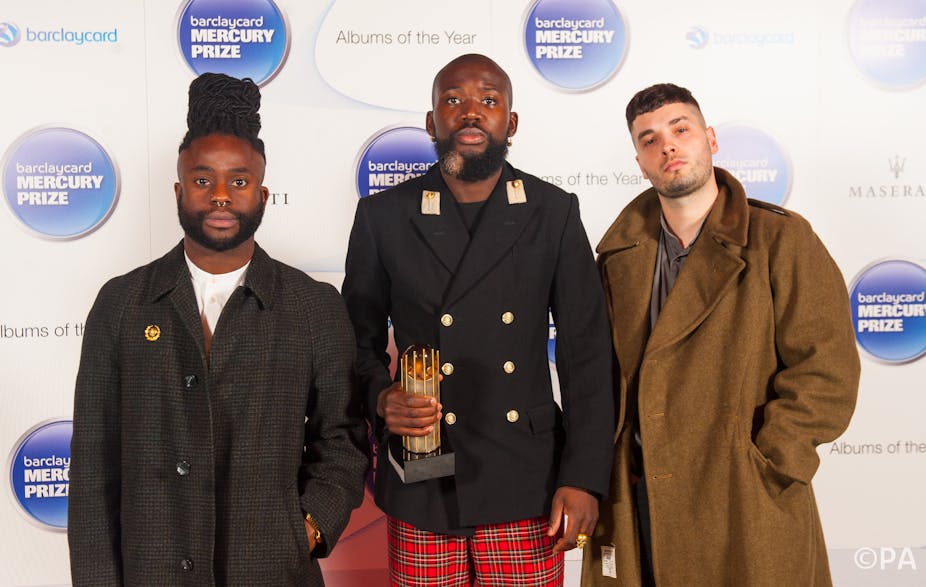I’m not going to start this article by referring to Young Fathers as an “Edinburgh-based hip-hop group”. It’s not clear whether they are currently based in Edinburgh, consider themselves to be based in Edinburgh, or what it means to be based there anyway. They describe themselves as a “Liberian/Nigerian/Scottish psychedelic hip-hop electro boy band” and were in London to collect a £20,000 cheque as the winners of the 2014 Barclaycard Mercury Prize.
The judging panel of critics, radio DJs and artists decided that Young Fathers’ debut album, Dead, was the best one released by a British group or artist in the last 12 months. Better than the odds-on favourite, FKA Twigs, South London rapper/poet Kate Tempest, and purveyor of post-colonial melancholia, Damon Albarn.
At odds of 20-1, Young Fathers were a good outside bet but few would have predicted they would win. When asked how they would spend the prize money, Graham “G” Hasting said they would go to Berlin to record another album: a slightly different work ethic to one of the other “Scottish” groups, Primal Scream, who famously lost their winner’s cheque while celebrating the victory of Screamadelica in 1992.
Identity crisis
I use quotation marks around the word “Scottish” because while the original members of Primal Scream hailed from Glasgow and were associated with the sound of suburban places like Bellshill, they have been based in Brighton and other cities at different points during their career. I don’t remember them ever being described as “a Brighton-based band”. Place was irrelevant, though they continue to be claimed as a Scottish band, particularly when it comes to compiling lists of the greatest Scottish albums of all time.

Similarly, 2004 Mercury winners Franz Ferdinand are often referred to as a Glasgow band because its members met, worked, studied, played gigs and partied there. But Alex Kapranos was born in England and it would be interesting to find out how many days of the year they spend in Glasgow or how committed they are to any one particular scene.
Artists working at this level may be less likely to acknowledge the same geographical boundaries that the media like to put on them. They want to cross borders rather than be defined by a single city or strangled and suffocated by a sense of Scottishness.
You can’t pin down a Young Father
Young Fathers refuse to categorise themselves as a Scottish hip-hop group or even a hip-hop group for that matter. They’re on record as saying that if you can be defined by a genre, you’ve failed as a musician or artist.
Of course, musicians and artists always say this when they want to considered innovative: they don’t want to be restricted by marketing categories. Bristol musicians Massive Attack, Portishead and Tricky were uncomfortable with the term trip-hop, for example, because they were working across a number of musical genres: hip-hop, reggae, post punk.

Young Fathers are no different. Signed in the US to avant-garde hip-hop label Anticon, their sound includes African influences – Alloysious Massaquoi was born in Liberia and Kayus Bankole is the son of Nigerian parents. And there are lyrical references to AK47s, not generally the weapon of choice on the streets of north Edinburgh where they grew up.
Authenticity isn’t their priority, even though it has been important throughout the history of hip-hop with its rhetoric of “keeping it real”. Young Fathers are more about artifice, creating new imaginative worlds for themselves and listeners. They’ve said they wanted to “make something bigger than the city we were living in” and seem dedicated to making artistic statements rather than political ones.
That’s refreshing in a country where indie rock with Scottish accents has ruled the airwaves over the last few years. The recent referendum debate found most musicians supporting a rather depressing artistic consensus in favour of independence, with some becoming too closely associated with saltire-waving and nationalist politicians. If the role of the artist is to question and challenge orthodoxies, it’ll be interesting to hear what Young Fathers do next as they continue to try and evade categories relating to place, nation or musical genre.

